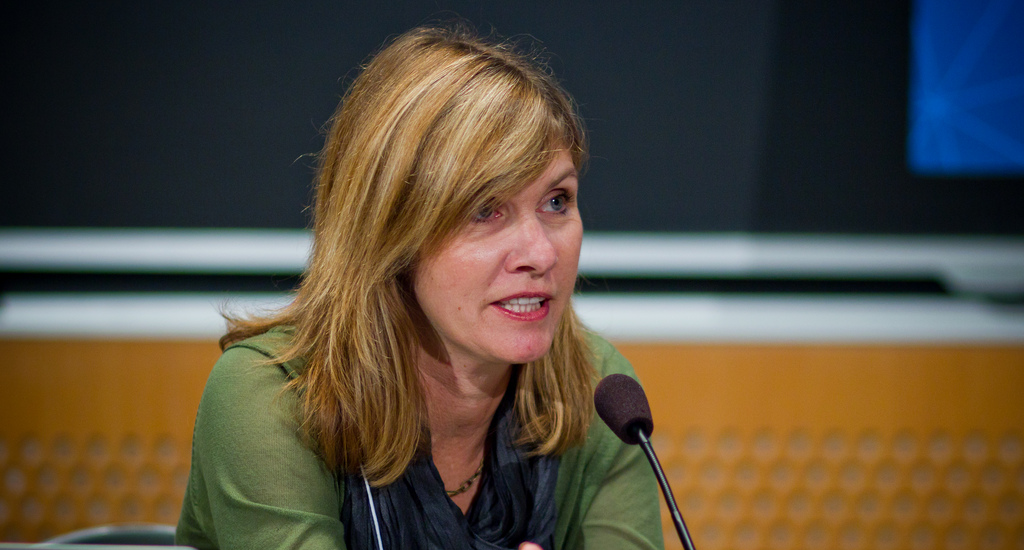What are some aspects of your scholarly background that you would like to share?
My PhD is in communication from the University of California, San Diego. When I was in graduate school, I was trained in historical materialism, the political economy of communication and media, feminist theory, and cultural studies. And one aspect that was very important to me about cultural studies was that it asks us scholars to take popular culture and the public seriously. All of my work has looked at subjects that have been marginalized in other disciplines or thought of as not serious, such as women, children, and pop culture. I also perceive myself to be an active participant in popular culture. Popular culture is a space for our hopes and dreams, as well as for our anxieties and fears. Because it is such an affective space, we need to take it seriously. We should not create hierarchies about what is worthy of study and what is not. My first book was on the Miss America pageants, which most academics are smug about. So, my identity as a scholar is to recognize the kind of things that give me joy, that give me pause or outrage me, and that are worthy of our studies. While it is true that I am a professor, I also want to be known by the public as part of that public. I am not someone who is outside or looks down on the public or passes judgment, but someone who participates in the creation of the public.
Can you tell us more specifics about your body of work?
My work is informed by feminist methodology and viewpoint. That does not mean everything I have written is about women or gender, but it does mean that my body of work is dedicated to thinking about gender equality in both popular culture and in the public. In addition to my work on the Miss America pageant, I looked at the children’s cable channel Nickelodeon and took seriously the way in which the network created a brand that was about children who were not given formal citizenship rights. I looked at how it created a class of consumer citizenship. For my book Authentic, I wanted to take brand culture seriously to find out what it means that we live our lives through brands. At the same time, I worked against a intellectual position that commercialism is bankrupt of political meaning. My latest book addresses the public embrace of certain kinds of feminisms, which we nevertheless need to critically analyze. We need to think about what they make visible and what they eclipse into the shadows. And when I did this research, it was impossible to not come across misogyny. Misogyny is not outside of cultural norms, but rather that it is increasingly part of these norms. And we have to take this seriously.
When you say feminism, what do you mean exactly?
There are different kinds of feminism, and I am a feminist media scholar. So I look at the relationships between feminism and media. What I argue in my recent book is that a particular kind of spectacular feminism has come into the spotlight, and it eclipses other feminisms. This feminism also makes a universal claim of what feminism is and carries an empty notion of empowerment. My question is, what do we want feminism to do? Feminism is not about wearing jewelry or saying affirmations to ourselves in front of the mirror every day, but it is about challenging structure and patriarchy. I do not think the feminism that is circulating in the media is actually achieving that. We need to work to ensure that it is not just a surface level feminism that feels safe and distracts us from structural critique.
How do perceive the relationship between media and religion?
Religion is something that is deeply felt on a personal and affective level. Religion is about ritual, history, family, and personal identity. That being said, the way in which religion is understood by the public is facilitated by the media. It is not just that the media circulates stories on Christianity, for instance, but that media has a certain rhetoric on salvation, redemption, or God. There are lots of religion and media scholars who talked about how media works as a conduit, facilitator, or as a disseminator of messages, especially in the United States. Furthermore, anti-Muslim or anti-Hindu messages are circulated as narratives in the media. The media is powerful in creating stories that we tell ourselves about ourselves, and religion is one of those stories. But it is only a certain kind of story about religion that gets embedded or woven into the media narrative.
What are the challenges and potentialities of public scholarship?
The reason why I am part of this group on public scholarship is because there is a general move in Western scholarship towards how we can make scholarly work more accessible to the public. We are in a moment of increasing right-wing movements across the globe and, as a feminist and media scholar, I am in fields that traditionally have been critical of authoritarianism, totalitarianism, and of fascism. If we are still just writing for each other, our work does not have the impact it needs to have. We need to figure out different ways of expressing our messages, arguments, and analyses in a language that is not arcane or deliberately obfuscating, but that is accessible. I just wrote a book on the popular, and the subtitle is Popular Feminism and Popular Misogyny. While it is true that I am writing for my community of feminist media scholars, I am also writing about the popular. I want people to participate in the kinds of campaigns and media messages that I write about in the book. I want them to hear what I have to say about it in a way that is accessible. I think the landscape is changing and we need to figure out how to communicate deep theorization and critical thinking about something that people experience in their everyday lives.
What is your current medium of public scholarship? What are your goals?
I did something that felt difficult to me. I asked for a bimonthly column in the Los Angeles Review of Books on popular feminism. I have been able to communicate really complex ideas about popular feminism and misogyny in that column. And I have written a couple of op-eds that have been picked up in different places. I think more and more media outlets are amenable to publish those of us who have something to contribute that is not just moralizing a particular moment, but who historicize this moment and connect it to other dynamics of power and inequity. And if we want our work to reach the public, we need to be willing to adapt a little bit to writing in a way that is different from how we would in a niched enclave.
Interview by Susanne Stadlbauer, photo by Greg Peverill-Conti

